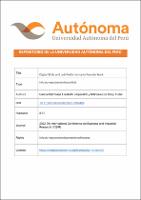| dc.contributor.author | García-Salirrosas, Elizabeth Emperatriz | |
| dc.contributor.author | Millones-Liza, Dany Yudet | |
| dc.date.accessioned | 2022-07-21T17:54:08Z | |
| dc.date.available | 2022-07-21T17:54:08Z | |
| dc.date.issued | 2022-06-08 | |
| dc.identifier.uri | https://hdl.handle.net/20.500.13067/1986 | |
| dc.description.abstract | The objective of this study is to estimate the level of association between digital skills and job performance in remote work in a developing country such as Peru. A non-probabilistic convenience sampling was applied and it was possible to reach 350 adequate surveys for the development of this work. The population of this study were workers from the city of Lima, who were working remotely. For the validation of the instrument, the exploratory factorial analysis (EFA) and confirmatory factorial analysis (CFA) were carried out and the Spearman’s RHO statistic was used for the hypothesis test. The result showed that there is a positive and significant relationship (Rho 0.427; p value 0.000). It is concluded that the greater the development of digital skills, the higher the level of job performance of workers in remote mode. | es_PE |
| dc.format | application/pdf | es_PE |
| dc.language.iso | eng | es_PE |
| dc.publisher | IEEE | es_PE |
| dc.rights | info:eu-repo/semantics/restrictedAccess | es_PE |
| dc.rights.uri | https://creativecommons.org/licenses/by-nc-nd/4.0/ | es_PE |
| dc.subject | Digital skills | es_PE |
| dc.subject | Remote work | es_PE |
| dc.subject | Job performance | es_PE |
| dc.title | Digital Skills and Job Performance in Remote Work | es_PE |
| dc.type | info:eu-repo/semantics/article | es_PE |
| dc.identifier.journal | 2022 7th International Conference on Business and Industrial Research (ICBIR) | es_PE |
| dc.subject.ocde | https://purl.org/pe-repo/ocde/ford#5.02.04 | es_PE |
| dc.publisher.country | US | es_PE |


